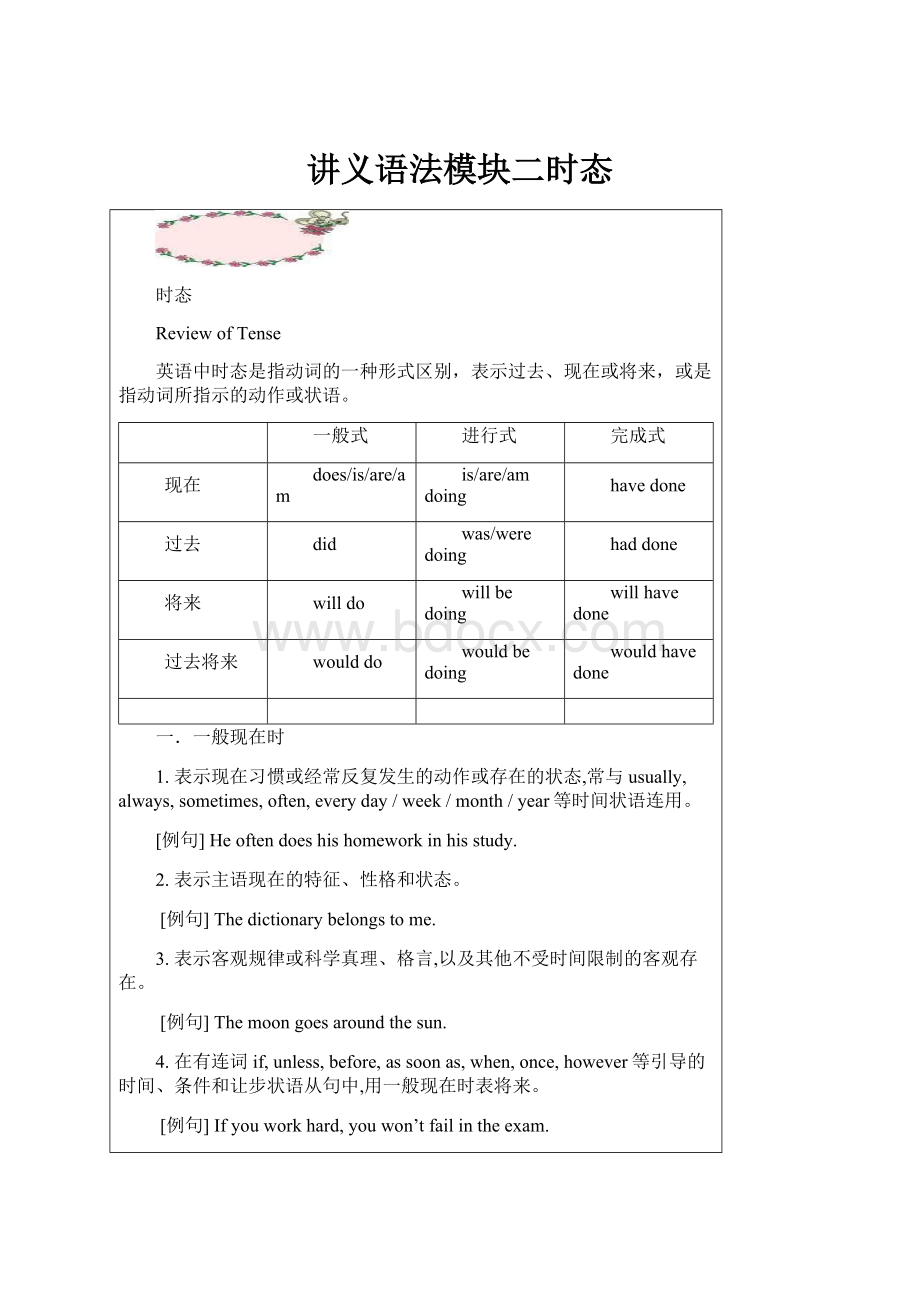讲义语法模块二时态.docx
《讲义语法模块二时态.docx》由会员分享,可在线阅读,更多相关《讲义语法模块二时态.docx(29页珍藏版)》请在冰豆网上搜索。

讲义语法模块二时态
时态
ReviewofTense
英语中时态是指动词的一种形式区别,表示过去、现在或将来,或是指动词所指示的动作或状语。
一般式
进行式
完成式
现在
does/is/are/am
is/are/amdoing
havedone
过去
did
was/weredoing
haddone
将来
willdo
willbedoing
willhavedone
过去将来
woulddo
wouldbedoing
wouldhavedone
一.一般现在时
1.表示现在习惯或经常反复发生的动作或存在的状态,常与usually,always,sometimes,often,everyday/week/month/year等时间状语连用。
[例句]Heoftendoeshishomeworkinhisstudy.
2.表示主语现在的特征、性格和状态。
[例句]Thedictionarybelongstome.
3.表示客观规律或科学真理、格言,以及其他不受时间限制的客观存在。
[例句]Themoongoesaroundthesun.
4.在有连词if,unless,before,assoonas,when,once,however等引导的时间、条件和让步状语从句中,用一般现在时表将来。
[例句]Ifyouworkhard,youwon’tfailintheexam.
二、一般过去时
1.表示过去某一时间发生的动作或存在的状态。
[例句]Shewenttothezooyesterday.
2.在时间、条件状语从句中代替过去将来时。
[例句]Hesaidwhenshecamehewouldtellher.
三、现在进行时
1.表示现在(说话瞬间)正在进行或发生的动作。
[例句]Heisreadinganewspapernow.
2.表示当前一段时间内的活动或现阶段正在进行的动作(说话时动作不一定正在进行)。
[例句]Whatareyoudoingthesedays?
3.表示说话人现在对主语的行为表示赞叹或厌恶等,常与always,constantly,continually等副词连用。
[例句]Heisalwaysthinkingofothers.
4.表示在最近按计划或安排要进行的动作。
常限于go,come,leave,start,arrive等表“移动”、“方向”的词。
[例句]Heiscomingtoseemenextweek.
四、过去进行时
1.表示过去某时正在进行的动作。
[例句]HewassleepingwhenMarycametoseehim.
2.动词go,come,leave,arrive,start等的过去进行时常表过去将来时。
[例句]ShesaidshewasgoingtoBeijingthedayaftertomorrow.
五、一般将来时
1.表示将来发生的动作或存在的状态,常与表示将来的时间状语连用。
[例句]Idon’tknowwhatwillhappeninthefuture.
2.常用来表示将来时的结构包括:
(1)shall/will+动词原形:
(单纯)表将来,一般不用于条件句。
(2)begoingto+动词原形:
(计划)打算做……。
(3)beaboutto+动词原形:
即将或正要去做某事,通常不与时间状语连用,但可与when引导的从句连用。
(4)beto+动词原形:
预定要做……。
(5)bedoing表示按计划、安排即将发生的动作,常与go,start,setout,leave,reach,arrive,return,come,move等表位移的动词连用。
六.过去将来时
一、过去将来时的构成:
1、would/should+动词原形
2、was/weregoingto+动词原形
二、过去将来时的用法:
1、表示从过去某时看将要发生的动作或存在的状态。
常用于主句是一般过去时的宾语从句中。
例如:
Hesaidthathewouldfinishhisworkbefore9o’clock.
他说他会在九点之前完成工作。
1.表示过去的某种习惯,只要would。
例如:
Wheneverhehasbeenintrouble,wewouldgivehimahand.
每当他遇到困难时,我们总会伸出援助之手。
巩固练习:
1、Hesaidthathe(come)backtonight.
2、Ithoughtit(rain)soon.
七.过去进行时
一、过去进行时的构成:
was/were+动词的现在分词(--ing)
二、过去进行时的用法:
1、表示在过去某时刻正在进行或发生的动作,通常与表过去的时间壮语连用。
例如:
Atthismomentyesterday,Iwaspackingforcamp.
昨天这个时候,我正在收拾东西去露营。
2、表移动的动词,如come,go,arrive,leave,start,begin,return等词的过去进行时,可以表示过去将要发生的动作。
例如:
ShetoldmethatshewasgoingtoHainanforherholiday.她告诉我她将去海南度假。
3、在含有时间状语从句的复合句中,表示一个过去的动作发生时或发生之后,另一个动作正在进行。
例如:
Itwasrainingwhentheyleftthestation.他们离开车站时,正下着雨。
WhenIgottothetopofthemountain,thesunwasshining. 我到达山顶时,阳光灿烂。
4、在叙述或描写过去的事情时,过去进行时经常与其它过去时态,特别时是一般过去时连用。
但是过去进行时往往是表示背景。
例如:
Onenight,hewastypinginhisstudy.Suddenly,amanbrokeintohishouseandcutofftheelectricity….
一天晚上,他正在书房里打字。
突然,一个人闯进屋来,切断了电源……
巩固练习:
1、Mary___adresswhenshecutherfinger.
A.made B.ismaking C.wasmaking D.makes
2、Asshe___thenewspaper,Granny___asleep.
A.read;wasfalling B.wasreading;fell C.wasreading;wasfalling D.read;fell
八.现在完成时
一、现在完成时的构成:
助动词have/has+动词的过去分词
二、过去分词的构成:
过去分词的规则变化与动词过去式的变化相同,在动词词尾加-ed;
写出下列动词的过去分词形式。
1、bring2、catch3、do4、find
5、eat6、get7、forget8、cut
9、pay10、know11、buy12、see
13、come14、sleep15、spend16、tell
1.现在完成时的用法
1、表示过去发生或已经完成的动作对现在造成的影响或结果,常与already,yet,ever,never,just,before等词连用。
例如:
Haveyouevercookedathome?
你吃晚饭了吗?
Youhavealreadygrownmuchtaller.你已经长高了许多。
2、表示过去已经开始,持续到现在的动作或状态,并可能还要延续。
往往和表示一段时间的时间状语连用,常用的有:
for+一段时间;since+过去时间点或从句。
(Since用来说明动作起始时间,for用来说明动作延续时间长度),提问用Howlong.
例如:
Ithasbeenfiveyearssincehejoinedthearmy.他参军五年了。
TheyhavelearnedEnglishforeightyears.他们已学了八年的英语了。
3、现在完成时需注意的问题:
表示短暂性的动词不能与表示一段时间的状语连用appear,begin,borrow,lend,buy,close,
come,die,fall,find,finish,join,kill,leave,sell,stop等。
例如:
Hehasjoinedthearmyforfiveyears.(错误)
Hehasbeeninthearmyforfiveyears.(正确)
注意:
非延续性动词的否定形式可以与表示延续时间的状语连用。
即动作不发生的状态是可以持续的。
(错)Ihavereceivedhisletterforamonth.
(对)Ihaven'treceivedhisletterforalmostamonth.
不能和明确的过去时间状语连用,如:
yesterday,lastweek,in1998,twodaysago等。
have/hasbeento和have/hasgoneto的区别:
have/hasbeento
have/hasgoneto
试举例:
比较一般过去时与现在完成时
一般过去时表示过去某时发生的动作或状态,强调动作,不和现在发生联系,常与具体的过去时间状语连用,如yesterday,lastweek,…ago,in1980,inOctober,justnow等,;现在完成时表示过去发生的某一动作对现在造成的影响或结果,强调的是现在的情况,不能与表过去的时间状语连用。
Isawthisfilmyesterday.(强调看的动作发生过了)
Ihaveseenthisfilm.(强调对现在的影响,电影的内容已经知道了)
Whydidyougetupsoearly?
(强调起床的动作已发生过了)
HehasbeenaLeaguememberforthreeyears.(强调他是团员)
巩固练习:
1、-Doyouknowourtownatall?
-No,thisisthefirsttimeI___here.
A.was B.havebeen C.came D.amcoming
2、-Haveyou____beentoourtownbefore?
-No,it'sthefirsttimeI___here.
A.even,come B.even,havecome C.ever,come D.ever,havecome
3、Doyouknow________?
A.howlonghashelivedhereB.howlonghehaslivedhere
C.hehaslivedherehowlongD.hehaslivedhowlonghere
九.过去完成时
一、过去完成时的构成:
助动词had+动词过去分词
二、过去完成时的用法:
1、表示在过去某一时间或动作以前已完成的行为或存在的状态。
即发生的时间是过去的过去。
常与“by/before+过去时间”构成的短语连用。
例如:
Thetrainhadalreadyleftbeforewearrived.在我到达之前,火车已经开走了。
HesaidthathehadlearnedsomeEnglishbefore.他说过他以前学过一些英语。
2、表示在过去某一时间点之前已经持续了一段时间的动作或状态,常与for/since引导的表示过去的时间状语连用。
例如:
IhadlivedinAmericafortwoyearsbeforeIcamehere.
我来这儿之前在美国住过两年。
2.表示过去未曾实现的计划、愿望等。
这种用法中常用的动词为hope,want,plan,wish,expect,think,intend,mean,suppose等。
例如:
Wehadhopedthatyouwouldcome,butyoudidn't.
那时我们希望你能来,但是你没有来。
Ihadthoughtthatallknewaboutit.我以为他们都知道这件事呢。
◆动词时态应注意的几点
1.瞬间性动词的一般现在时和现在进行时常用来表示将来的动作。
例句:
①Thefilmbeginsinaminute.
②Myuncleisleavingtomorrowmorning.
2.在时间、条件、让步状语从句中,常用一般现在时代替一般将来时。
例句:
①EverytimeIlistentothatsong,I’llthinkofmyoldfriend.
②Ifyoudothat,Ishallbeverypleased.
③They’llstandbyyouevenifyoudon’tsucceed.
3.一般过去时和现在完成时的区别:
一般过去时和现在完成时都表示过去所发生的动作,但现在完成时强调这一动作与现在的关系,如对现在产生的影响、结果等,所以它不能和表示过去的时间状语连用;一般过去时只表示过去的事实,不表示和现在的关系,因而它可以和表示过去的时间状语连用。
如:
—Haveyoufinishedyourwork?
—Yes,Ihave.
—Whendidyoufinishit?
—Ifinisheditlastsummer.
◆直接引语与间接引语转换时应注意的几个问题:
1.人称的变化
2.时态的变化
3.时间状语的变化
4.地点状语的变化
例句:
①XiaoYisaid,“Iwanttogototheparkthisafternoon.”
→XiaoYisaid(that)hewantedtogototheparkthatafternoon.
②Bobsaid,“We’llhaveameetingheretomorrowmorning.”
→Bobsaid(that)theywouldhaveameetingtherethenextmorning.
基础练习:
I.Fillintheblankswiththeverbsgivenintheirproperforms.
1.Lisa__________(listen)tothesongsbyBeatlesat8o'clocklastSunday.
2.He________already_________(arrive)whenIcame.
3.Lastnightwe__________(notgo)backhomeuntiltheteacherleftschool.
4.ComradeLiDazhao___________(put)inprisonin1927.
5.Wecouldnothelp__________(laugh)afterweheardthestory.
6.Wouldyouplease__________(bring)meanEnglish-Chinesedictionarywhen,youcome?
7.Hetoldmethathe__________(visit)theGreatWalltheyearbefore.
8.I'lltellhimthenewsassoonashe__________(come)back.
9.There__________(be)aphysicstestnextMonday.
10.I'msorryyou'vemissedthelastbus.It_________(leave)tenminutesago.
Ⅱ.Multiplechoice.
1.BythetimeJanegetshome,heraunt________forLondontoattendameeting.
A.willleaveB.leavesC.willhaveleftD.left
2.Themanagerhadfallenasleepwherehe________,withoutundressing.
A.waslayingB.waslyingC.hadlaidD.hadlied
3.WhenMarkopenedthedoor,hesawawomanstandingthere.He________herbefore.
A.neversawB.hadneverseenC.neverseesD.hasneverseen
4.Thelittlegirl________herheartoutbecauseshe________hertoybearandbelievedshewasn'tevergoingtofindit.
A.hadcried;lostB.cried;hadlost
C.hascried;haslostD.cries;haslost
5.JohnandI________friendsforeightyears.WefirstgottoknoweachotherataChristmasparty.Butwe______eachotheracoupleoftimesbeforethat.
A.hadbeen;haveseenB.havebeen;haveseen
C.hadbeen;hadseenD.havebeen;hadseen
6.Allmorningasshewaitedforthemedicalreportfromthedoctor,hernervousness______.
A.hasgrownB.isgrowingC.grewD.hadgrown
7.—________DavidandVicky__________married?
—Foraboutthreeyears.
A.Howlongwere;beingB.Howlonghave;got
C.Howlonghave;beenD.Howlongdid;get
8.Thenewscameasnosurprisetome.I________forsometimethatthefactorywasgoingtoshutdown.
A.hadknownB.knew
C.haveknownD.know
9.She________totheofficethanshegotdowntowritingthereport.
A.hasnosoonergotB.hadhardlygot
C.nosoonergotD.hadnosoonergot
10.Whenhewasalive»theoldscientistusedtosaythatknowledge______frompracticeandhegainedhisexperiencebydoingalotofpracticalwork.
A.wascomingB.hadcomeC.comesD.wouldcome
参考答案:
GrammarI.Fillintheblankswiththeverbsgivenintheirproperforms.
1.waslistening2.had;arrived3.didn'tgo4.wasput5.laughing
6.bring7.hadvisited8.comes9.willbe10.left
I.Multiplechoice.
l.C2.B3.B4.B5.D6.C7.C8.A9.D10.C
基础练习一
1.Don’tmakesomuchnoise.Thestudents____anEnglishclass.
A.arehaving B.have C.had D.werehaving
2.—Whereisthelibrarian?
—She____tothebookshop.
A.went B.hasgone C.goes D.willgo
3.—Nicetoseeyou.I____youforalongtime.
—I____inBeijing.I’vejustcomeback.
A.hadn’tseen,am B.haven’tseen,was
C.didn’tsee,willbe D.haven’tseen,shallbe
4.He’llgotoworkinXi’anwhenhe____schoolnextyear.
A.leavesB.isleavingC.willleaveD.hasleft
5.____fiveyearssincewebeganlearningEnglish.
A.Thereare